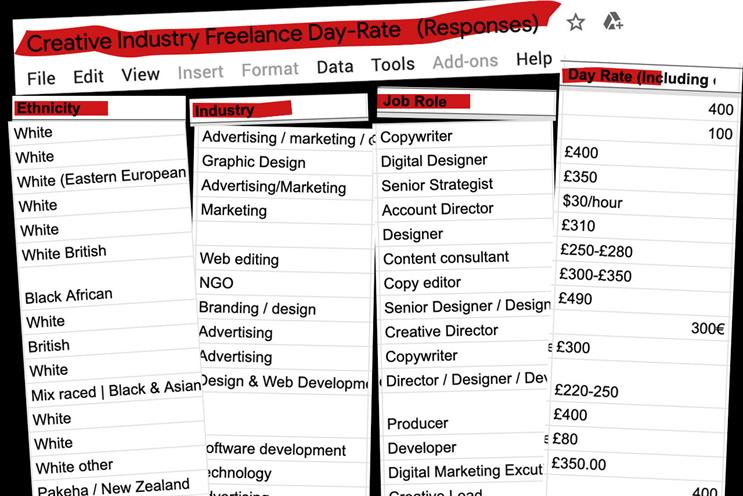
A new initiative is calling on freelancers in the creative industries to disclose their day rates in an attempt to close the race and gender pay gaps.
Alex Holder, a writer, creative and former executive creative director at Anomaly London, and journalist Anna Codrea-Rado have set up a in which freelancers from the creative industries can their day rate, job role, company, ethnicity and gender identity.
The document has had more than 300 entries since its launch last week, and Holder and Codrea-Rado are aiming to get at least 1,000 responses to be analysed and shared with the freelance community.
The #FreelancerPayGap project is the latest in a series of similar initiatives pushing for greater transparency and equality of pay across industries. Last week, Codrea-Rado started another public and anonymous Google Doc that has received more than 500 entries so far.
Codrea-Rado was inspired by the , an Instagram account that publishes direct messages from influencers around the world to unveil how much they were paid for posts, with the aim of exposing the pay gap between black and white influencers. "More transparency, more accountability," the account’s biography reads.
In the publishing industry, author LL McKinney started the #PublishingPaidMe hashtag earlier this month and asked authors to reveal the advances that publishers paid them. The hashtag has gone viral, with high-profile writers including Roxane Gay and Matt Haig disclosing their advances.
"The point is to highlight the disparity between what non-black authors are paid and what black authors are paid," McKinney .
All of these initiatives are a direct response to the recent resurgence of the Black Lives Matter movement, Holder explained: "Money is fundamental to equality. Until everybody’s paid fairly, we won’t have an equal society.
"People have realised that if you want to achieve equality, you’ve got to risk your own privilege, and they are finally willing to do that. We can’t keep saying ‘black lives matter’ and ‘we want equality’ if we’re being secretive about pay – ultimately, it keeps the powerful powerful."
Covid-19 hastening demand for equality
The coronavirus pandemic has also further exposed inequalities at work and in greater society, Codrea-Rado said. Most notably, the virus has had a disproportionate impact on people from black, Asian and minority-ethnic backgrounds – something that has .
Amid this crisis, many companies are taking cost-cutting measures such as redundancies, salary decreases and furloughing – a move that some fear will harm the creative industries' already slow progress on diversity. There is already evidence pointing to this: in ±±ľ©Čüłµpk10 and Creative Equals’ first Covid-19 Inclusion Pulse, women and minority groups reported more psychological stress, unfair treatment at work and concerns about long-term job security.
The freelance community was particularly hard hit by business cuts, because in many cases agencies’ freelance budgets were the first to go, Holder noted. Yet now that many employees with established, full-time positions are also losing their jobs, more people may be considering freelance work in the future, she added.
"What I saw in lockdown is that everyone realised that no-one is secure," Holder said. "What is security now? I feel so much more secure having 10 freelance clients and my fingers in a few different industries."
Even before the coronavirus crisis, freelancers faced certain structural issues that sometimes led to unfair treatment, such as late payments from companies. Last year, Codrea-Rado launched the , which called on the media industry to pay its freelancers fairer, better and faster.
Greater transparency needed
Now, as coronavirus upends how people work and the Black Lives Matter movement increases scrutiny on inequalities, ensuring fair pay for all will be an important hurdle to overcome – but that cannot be achieved without transparency, Holder and Codrea-Rado said.
Since 2017, UK companies with 250 or more employees have been required by law to publish their gender pay gaps. The reports have revealed that women in the UK are paid just 82p for every £1 their male colleagues receive, and in the advertising industry the gender pay gap is as high as 38.3% at some agencies, according to the latest figures.
But no such legislation exists to require ethnic pay-gap reporting. Freelancers are also often in the dark about pay.
That is why Holder and Codrea-Rado are hoping their initiative will shed some light and empower more people to get the pay they are entitled to.
"Since the pandemic, there is a general feeling that so many things around us are broken at a very deep, structural level," Codrea-Rado said. "It’s not a case of going back to normal, but it’s about rebuilding a better future and how we make sure that what we rebuild is actually better than what we had before. The theme running through everything is that we need radical, serious change."




.jpg)
.jpeg)
